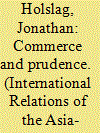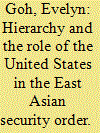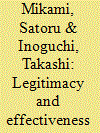|
|
|
Sort Order |
|
|
|
Items / Page
|
|
|
|
|
|
|
| Srl | Item |
| 1 |
ID:
083219


|
|
|
|
|
| Publication |
2008.
|
| Summary/Abstract |
Against the backdrop of 9/11 and the Bush administration's subsequent invasions of Iraq and Afghanistan, many have argued that international perceptions of the United States are growing more negative and that 'anti-Americanism' is going to be a problem for American foreign policy in the decades to come. We examine the debate over anti-Americanism by using survey data collected in more than 26 countries that span East, Southeast, South, and Central Asia, with a focus on two empirical questions. First, to what extent do citizens in Asia believe that the United States has a negative (or positive) influence on their country? Second, what factors, at both the individual and national level, shape the perceptions of American influence? Although we uncover little evidence of pervasive anti-Americanism, the results of our multilevel model generally confirm the theoretical importance of three explanations for international perceptions of the United States-interest theories, cultural and political similarities, and increased information and contacts
|
|
|
|
|
|
|
|
|
|
|
|
|
|
|
|
| 2 |
ID:
083220


|
|
|
|
|
| Publication |
2008.
|
| Summary/Abstract |
This paper evaluates the extent to which China adapted its Africa policy to external criticism and expectations. It is found that policy modifications mainly occurred when long-term interests were at risk, with regard to issues of limited importance and non-binding initiatives. The article departs from the vast literature on adaptation and tests this concept on several aspects of China's engagement in Africa. This approach not only allows us to revise the PRC's changing Africa policy but also permits to contribute to the debate whether China is a status quo or revisionist power. In this regard, it turns out that China's ostensible compliance with the demands of other actors is designed to give leeway to its revisionist aspirations
|
|
|
|
|
|
|
|
|
|
|
|
|
|
|
|
| 3 |
ID:
083221


|
|
|
|
|
| Publication |
2008.
|
| Summary/Abstract |
To construct a coherent account of East Asia's evolving security order, this article treats the United States not as an extra-regional actor, but as the central force in constituting regional stability and order. It proposes that there is a layered regional hierarchy in East Asia, led by the United States, with China, Japan, and India constituting layers underneath its dominance. The major patterns of equilibrium and turbulence in the region since 1945 can be explained by the relative stability of the US position at the top of the regional hierarchy, with periods of greatest insecurity being correlated with greatest uncertainty over the American commitment to managing regional order. Furthermore, relationships of hierarchical assurance and hierarchical deference help to explain critical puzzles about the regional order in the post-Cold War era.
|
|
|
|
|
|
|
|
|
|
|
|
|
|
|
|
| 4 |
ID:
083222


|
|
|
|
|
| Publication |
2008.
|
| Summary/Abstract |
There is an empirical evidence of an aid-for-policy deal between the United States and other states; the United States has utilized aid programs to promote affirmative votes in the UN General Assembly and to maintain an alliance relationship with strategically important states. However, whether there is a systematic evidence of an aid-for-participation deal remains inconclusive. Does the United States generally utilize its foreign aid to reward the contribution of troops to the US-led multinational forces and to punish the lack of contribution? The author argues that US foreign aid is used to prevent free-riding in coalition participation. To test the argument, I examined whether states were punished or rewarded by the United States for their behavior in sending or failing to send troops to 15 post-Second World War US-led coalition forces. The results show that the United States punished states for unexpected nonparticipation, but did not always provide rewards for support
|
|
|
|
|
|
|
|
|
|
|
|
|
|
|
|
| 5 |
ID:
083218


|
|
|
|
|
| Publication |
2008.
|
| Summary/Abstract |
This article investigates the political attitudes of Thai citizens, who have been exposed to a harsh political climate in recent years. Two questions we address here are: (a) how people perceived the quality of governance under the Thaksin administration and the subsequent provisional military government, and (b) what impacts, if any, the populist style of politics as well as the military coup have had on the political beliefs of the Thai population. The statistical analysis based on AsiaBarometer Survey data locates a plunge in public perception that occurred during the period between the Thaksin era and the military government, but it also reveals that the difference is largely a product of inflated populist policies, and that people's commitment to a democratic system was already fragile before the coup
|
|
|
|
|
|
|
|
|
|
|
|
|
|
|
|
|
|
|
|
|